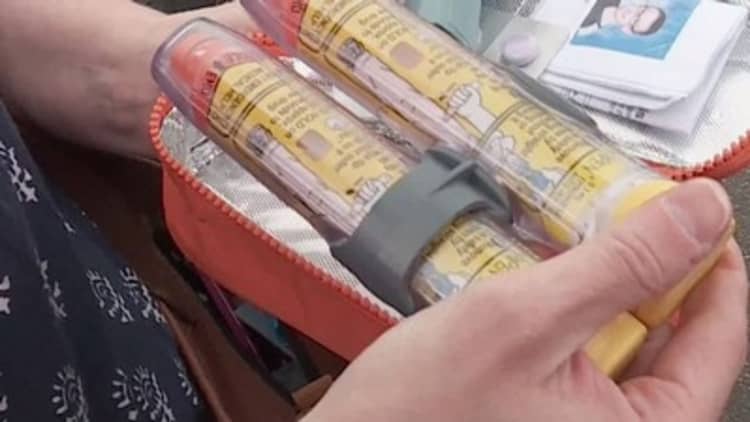The Food and Drug Administration accused a medical company of failing to investigate "hundreds of complaints that" the anti-allergy EpiPen device has misfired "during life-threatening emergencies," including some cases in which people later died.
That stunning revelation is contained in a damning warning letter the FDA sent to the division of drug giant Pfizer, which makes EpiPens for another pharmaceuticals behemoth, Mylan.
The letter cites multiple "significant" regulatory violations related to the manufacturing of EpiPen discovered during inspections during February and March of this year at a Missouri facility operated by Meridian Medical Technologies, the Pfizer-owned company.
It is the same facility that produced EpiPen lots which were subject to a recall earlier this year after two reports of the auto-injector devices misfiring. At the end of that recall, which is mentioned in the FDA letter, there were no public reports of deaths associated with EpiPens.
EpiPens are used to deliver a dose of the drug epinephrine to people who are suffering a potentially fatal allergic reaction known as anaphylaxis.
Mylan is the leading seller, by far, of auto-injectors containing epinephrine.
The FDA's letter dated Tuesday to Meridian noted that "patients can died or suffer serious illness" if the EpiPen injectors do not operate as expected, or do not deliver the intended dose of epinephrine.
Despite that, the FDA charged, "you failed to thoroughly investigate multiple serious component and product failures for your EpiPen products, including failures associated with patient deaths and severe illness."
"Your own data show that you received hundreds of complaints that your EpiPen products failed to operate during life-threatening emergencies, including some situations in which patients subsequently died," the letter said.
Many of those complaints involved failures of EpiPen to activate when a user followed instructions for the device, the FDA said.
There were also complaints that the EpiPens had "spontaneously dispensed epinephrine drug prior to use so that the drug was no longer available when the user attempted to activate the product," according to the letter.
Between 2014 and 2017, Meridian records show, the company received samples of 171 EpiPens related to complaints that they failed to activate when a patient followed instructions properly.
The FDA noted that Meridian disassembled only a fraction of those 171 samples, and that when asked why that was the case, a quality control official at the company told inspectors it was policy not to disassemble the product unless "approved by management."
"Not only did Meridian not thoroughly investigate the complaints about EpiPens, the FDA said, but the company also did not remove "potentially defective products from the marketplace" despite the fact that "you had identified a a defect in one of the critical components use to manufacture these products."
The FDA ordered Pfizer's unit to correct the violations promptly. The agency's letter also says failure to do so may result in legal action including seizure and injunction.
When asked for comment, a Pfizer spokeswoman told CNBC, "Between 2015 and now, we have shipped more than 30 million EpiPen Auto-Injectors globally. It's not unusual to receive product complaints, especially when the product is frequently administered by non-medically trained individuals. We currently have no information to indicate that there was any causal connection between these product complaints and any patient deaths.
"We are very confident in the safety and efficacy of EpiPen products being produced at the site," the Pfizer spokeswoman said.
A spokeswoman for Mylan said, "Pfizer is continuing to work with FDA to resolve the points raised in the letter regarding Pfizer's manufacturing of EpiPen Auto-Injector and Mylan will do whatever it can to support this process."
"We note that Pfizer's recall several months ago of certain lots of EpiPen Auto-Injector was taken as a proactive and precautionary measure with FDA in relation to these issues," the Mylan spokeswoman said.
"Mylan has an unwavering commitment to quality and patient safety and we are confident in the safety and efficacy of EpiPen products being produced at the site. Further, we do not currently anticipate any supply issues as a result of the warning letter."
WATCH: Sen. Blumenthal demands Mylan pay Medicaid



